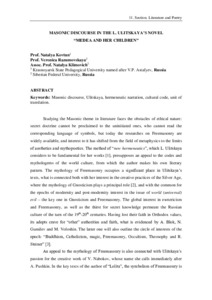Показать сокращенную информацию
Masonic Discourse in the L. Ulitskaya’s Novel Medea and Her Children
| Автор | Ковтун Наталья Вадимовна Разумовская Вероника Адольфовна Климович, Наталья Викторовна | |
| Дата внесения | 2019-07-01T07:22:29Z | |
| Дата, когда ресурс стал доступен | 2019-07-01T07:22:29Z | |
| Дата публикации | 2018-04 | |
| Библиографическое описание | Ковтун Наталья Вадимовна Разумовская Вероника Адольфовна Климович, Наталья Викторовна. Masonic Discourse in the L. Ulitskaya’s Novel Medea and Her Children [Текст] / Наталья Викторовна Ковтун Наталья Вадимовна Разумовская Вероника Адольфовна Климович // 5th International Multidisciplinary Scientific Conference on Social Sciences and Arts SGEM 2018. Conference Proceedings: Science and Art. — 2018. — Т. 5 (№ 6.1). — С. 259-266 | |
| URI (для ссылок/цитирований) | https://sgemworld.at/ssgemlib/spip.php?article5701&lang=en | |
| URI (для ссылок/цитирований) | https://elib.sfu-kras.ru/handle/2311/110638 | |
| Описание | Текст статьи не публикуется в открытом доступе в соответствии с политикой журнала. | |
| Аннотация | The interest in Freemasonry has shifted today from the field of metaphysics to the scope of aesthetics. The method of the “new hermeneutics”, proclaimed by Ulitskaya, presupposes an appeal to the world culture codes. The mythology of Freemasonry occupies an important place, which is connected both with interest in the Silver Age, and with a common for transitional epochs attention to the problem of world evil. The principle of high play, helping to overcome the boundaries of what is visible in the name of existence comprehension, is one of the distinctive features of the mythology of the masons and the poetics of Ulitskaya. The texts of the latter require an endless process of interpretation, in which the reader acts as a co-creator of the author. The novel “Medea and her children” summarizes Ulitskaya's early works, conceptualizing its codes characteristic. The text is a movement through the labyrinths of signs in search of primacy traces. The inevitability of the collision “delusion – enlightenment” building the fates of the characters, is provided by the genre archetype of Ulitskaya’s prose – the novel of upbringing, hence the attention to the Masonic-enlightening symbolism. The exposition of the novel is the history of the Sinopli family, which goes back to the ancient cultures; the conclusion contains the call of the narrator about entering the circle of elect – Medea's family. The hermeneutic gift, the ability to self-condition is the condition of initiation. The movement within the artistic space is duplicated by the description of “soul's troubles”; the text is full of motives about the afterlife, references to the Bible, Dante, and Masonic rituals. The famous symbols are given in the heroes’. The process of “thinking out” the canonical texts gives them a special topicality. When the novel leaves the area of its “native” culture and enters the broad context of “other” cultures via the process of literary translation it becomes the translation object containing units of translation of various nature. The cultural code of the original text is considered to be a unique unit of translation which needs decoding while compreheding the primary text and restoration while creating a secondary one. Being an important part of cultural memory, cultural code undergoes double decoding: as complex cultural information (semiotic system) and cultural information immersed in the context of literary text (secondary semiotic system). The successful translation takes place when an author, a translator and a reader share similar cultural codes. | |
| Тема | Masonic discourse | |
| Тема | Ulitskaya | |
| Тема | hermeneutic narration | |
| Тема | cultural code | |
| Тема | unit of translation | |
| Название | Masonic Discourse in the L. Ulitskaya’s Novel Medea and Her Children | |
| Тип | Journal Article | |
| Тип | Journal Article Postprint | |
| Страницы | 259-266 | |
| ГРНТИ | 17.07.51 | |
| Дата обновления | 2019-07-01T07:22:29Z | |
| DOI | 10.5593/sgemsocial2018H/61/S11.032 | |
| Институт | Институт экономики, управления и природопользования | |
| Подразделение | Кафедра делового иностранного языка | |
| Журнал | 5th International Multidisciplinary Scientific Conference on Social Sciences and Arts SGEM 2018. Conference Proceedings | |
| Квартиль журнала в Web of Science | без квартиля |

